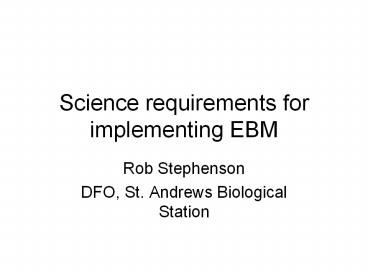Science requirements for implementing EBM - PowerPoint PPT Presentation
Title:
Science requirements for implementing EBM
Description:
EBM is the management of human activities to ensure that marine ecosystems, ... Not collecting relevant information (e.g. bycatch, area trawled) ... – PowerPoint PPT presentation
Number of Views:19
Avg rating:3.0/5.0
Title: Science requirements for implementing EBM
1
Science requirements for implementing EBM
- Rob Stephenson
- DFO, St. Andrews Biological Station
2
St. Andrews Biological Station
La Station biologique de St. Andrews
3
Ecosystem Based Management
- EBM is the management of human activities to
ensure that marine ecosystems, their structure
(e.g. biological diversity), function (e.g.
productivity) and overall environmental quality
(e.g. water and habitat quality) are not
compromised and are maintained at appropriate
temporal and spatial scales. - DFO 2005 Fs23-494-2006E
4
Challenge of Science 1
- Choose between the two views of science required
for an ecosystem-based approach - Describe, study and understand the ecosystem
- Modify science in support of management to
include a broader suite of ecosystem
considerations - Product a practical approach to defining the
science required for an Ecosystem-Based Approach
5
Science in support of management decisions
Ecoregion (with nested plans)
Managed activities
Fisheries Aquaculture Energy Transport
Conservation
- Productivity
- Biodiversity
- Habitat
Economic
Social
Objectives/strategies
Audit of cumulative performance
Cumulative impacts across activities
Plans with diverse objectives
6
Challenge of Science 2
- Better articulation of conservation objectives
(and strategies) - Together with relevant performance indicators and
reference points - Common (if possible) across all activities
- Product Consensus on what needs to be monitored
7
Changes in Conservation Objectives
- Productivity
- Primary Productivity
- Community Productivity
- Population Productivity
- Biodiversity
- Species Diversity
- Population Diversity
- Habitat
- Population Productivity
- Population Diversity
8
Fisheries strategies/indicators
Gavaris et al 2005
9
Challenge of Science 2b
- Resolve the issue of contextual indicators
- If all conservation objectives are articulated,
and if there are performance indicators for
eachare there any additional properties of the
ecosystem or overall indicators of ecosystem
health (or change) that need to be monitored? - How would these be used in management?
10
Science Decision Support
Indicator
- Decision on suitable reference point
- How the system dynamics influence the way we
manage
reference
state
11
Challenge of Science 3
- Develop methods of determining cumulative effects
- Consider the impacts of all fisheries, plus
aquaculture, plus other managed activities
against conservation objectives - Product Ability to audit the cumulative
performance of the activities of an area against
common conservation objectives
12
Plan Evaluation
Sum
For a biogeographic region
From Gavaris et al 2005
13
Challenge of Science 4
- Begin acquiring additional information essential
for Ecosystem-based management - EBM requires more performance indicators
- Not collecting relevant information (e.g.
bycatch, area trawled) - Product Modified surveys and monitoring systems
- Hard to add to monitoring systems during fiscal
restraint
14
Enhanced Fishery Monitoring
15
Challenge of Science 5
- Develop methods of integrating conservation with
social and economic objectives - Decisions are based on tradeoff among objectives
- Are conservation objectives simply constraints?
- Product Decision support systems for integrated
management and EBA - Evaluation of overall performance of activity
against multiple objectives
16
(No Transcript)
17
Our experience with this approach
- Offers a framework for prioritization of science
- Of direct and immediate relevance to management
18
(No Transcript)
19
Our experience with this approach
- Offers a framework for prioritization of science
- Of direct and immediate relevance to management
- Places all managed activities on the same page
- Makes EBM operational
20
(No Transcript)
21
- Following slides are for reference
22
Indicators
- Performance indicator
- Pertinent to strategy
- Measure response to managed activity
- Reference points are guideposts
23
What isEcosystem Based Management?
- Manage human activities to
- Control impact on ecosystem
- Recognize ecosystem influence on how we conduct
activity































